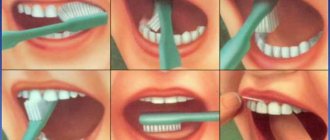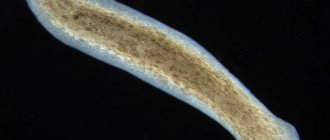Immediately after birth, the baby has a very pleasant smell. This is due to its “sterility”. The newborn has not yet had time to fully encounter the harmful effects of the environment, so the microflora of his body is clean and ideal. However, with age, parents may notice a rather unpleasant and even repulsive odor from the child’s mouth. This worries many, so let’s look at the causes of this pathology.
Bad breath - normal or pathological?
Your baby's breath may smell, especially in the morning, due to dry saliva, accumulation of bacteria in the mouth, or the development of a disease. In the latter case, the smell will be persistent and characteristic. If after morning procedures (brushing teeth and tongue, rinsing) the specific aroma does not go away, the child should be shown to a doctor. The pediatrician will examine him, conduct an examination and confirm or refute his family’s fears.
Why does a healthy child have a strange smell from his mouth? Let's consider the physiological reasons for this phenomenon:
- eating highly sweet, carbohydrate-containing foods or foods with a specific odor (onions, garlic);
- drying of the nasopharyngeal mucosa and saliva due to excessive physical activity, stress or after sleep;
- use of drugs that cause odor;
- a small child may put something in his nose (for example, a piece of washcloth, rubber), which will cause the object to rot and create an odor;
- hormonal changes during puberty, lack of vitamins, microelements and iodine in the body.
Principles of treatment
Treatment of halitosis - bad breath - is carried out in accordance with the cause that provoked it. If these are dental problems, dental treatment is necessary, as well as proper further oral hygiene.
For diseases of the gastrointestinal tract, treatment is prescribed individually by a gastroenterologist. For ENT diseases, medications are prescribed by an otolaryngologist. And if there is a suspicion that a child is developing diabetes, a consultation with an endocrinologist is required.
Important! It is strictly prohibited to treat a child on your own.
https://youtu.be/OUoeRfHtYsQ
The main causes of unpleasant odor
Bad breath appears at any age and can be associated with rot, iodine, acid, acetone, urine or rotten eggs (we recommend reading: symptoms, causes and treatment of acetone in urine in a child). With the transition to solid food and the appearance of teeth, infants and children over one year old have leftover food in the mouth, which leads to the proliferation of bacteria and fungi in the body. With proper care and oral hygiene, the odor usually disappears unless it is a symptom of a disease.
READ ALSO: Why does a child smell of acetone on his breath?
Let's consider the main causes of pathology:
- insufficient hygiene;
- diseases of the oral cavity;
- diseases of the ENT organs;
- bronchial infections;
- digestive system disease;
- damage to the liver, kidneys;
- diabetes.
Neglect of oral hygiene
The most common cause of morning odor is poor or improper child oral hygiene or the consumption of foods that cause a specific odor (for example, garlic).
Parents should take control of this issue, as some children neglect oral hygiene. As a result, many microbes appear on the leftover food in the mouth, it rots, decomposes, and plaque forms on the teeth and tongue (we recommend reading: how to remove black plaque on a child’s teeth?). Caries and bad breath appear.
Diseases of teeth and gums
Bad breath is accompanied by almost all diseases of the teeth and gums:
- caries;
- gingivitis (we recommend reading: gingivitis in children: treatment at home);
- stomatitis;
- periodontal disease;
- tartar, etc.
The child should be taken to the dentist, even if no changes are visible on the teeth. Many pathological processes in teeth begin without damage to the enamel, so examination by a specialist is necessary to exclude or confirm the diagnosis.
INTERESTING: Why can a child have yellow teeth?
Diseases of the nasopharynx
Bad breath may be a consequence of a developing disease of the ENT organs. The main diseases causing pathology:
- Acute, purulent or chronic tonsillitis (angina). As a result of the proliferation of bacteria in the nasopharynx, purulent plugs form on the tonsils, and the tonsils become inflamed. A child with a sore throat feels unwell, has pain when swallowing, and has a fever. Mucus with bacteria accumulates in the throat, which causes a putrid, sour smell.
- Sinusitis, acute or chronic rhinitis also causes the appearance of this unpleasant pathology. Purulent mucus flows down the back wall of the nasopharynx, stagnation of snot and pus occurs, so the child smells unpleasant.
- Neoplasms and cysts in the throat. This pathology is the most dangerous, since the only symptom may be a putrid odor from the mouth. Often the disease is asymptomatic.
Lung infections
Pulmonary infections affect bronchial secretions, causing mucus production and coughing. This process is very dangerous for children, especially for children under one year old. His lungs are not developed enough to get rid of mucus on their own, so it, along with bacteria, accumulates in the bronchial tree, and an odor appears when coughing. If the problem is not solved, bronchitis and pneumonia develop.
Digestive diseases
When, when communicating with a child, relatives notice that his breath smells sour or rotten, then most likely the baby has digestive problems.
The appearance of an unpleasant odor may indicate:
- gastritis;
- disruption of the stomach;
- excessive secretion of gastric juice;
- duodenal disease;
- neoplasms and tumors in the digestive organs;
- disruption of the valves in the stomach;
- poor nutrition.
Liver diseases
The appearance of a sweetish odor from a child’s mouth when exhaling indicates liver disease. If the disease occurs in an acute form, other symptoms also occur: changes in the color of the nails and skin, a yellowish coating on the tongue, itching and rash on the body. These symptoms indicate acute liver failure, disruption of its function and blood flow.
Liver disease is indicated by a sweetish or rotten odor not only from the mouth. Over time, the baby’s skin begins to exude the same aroma.
If additional symptoms appear, you should immediately consult a doctor, who will refer you for tests and an ultrasound. If measures are not taken in time and treatment is not started, the child may fall into a coma.
Kidney diseases
Your child's breath may smell like urine or ammonia. This pathology is associated with:
- unhealthy diet;
- taking medications;
- kidney disease (pyelonephritis, stones, neoplasms).
Kidney function is affected by a lack of fluid in the body. If a child drinks little water and his diet mainly consists of carbohydrate foods, this leads to increased stress on the urinary system. The kidneys fail to cope with their functions, urine stagnates in the body and decay products accumulate, which cause the smell of ammonia.
Diabetes
For proper functioning of the body, glucose is necessary, which comes from certain foods. The hormone insulin, which is produced by the pancreas, helps it get into the cells. If there is a lack of it, glucose is not transported into the cells, which leads to their starvation.
READ IN DETAIL: the main signs of diabetes in a child
This picture is observed in children with diabetes mellitus, when the hormone is not produced enough or is completely absent. This is caused by pathological changes in the pancreas. The reason for this may be heredity. The accumulation of glucose and ketone substances in the blood provokes the smell of acetone and iodine.
What can you do at home?
If the doctor has not found any pathological reason for the unpleasant odor from the child's mouth, parents can do the following:
- To normalize the composition of saliva, an appropriate climate must be created in the children's room. You may have to humidify the room using special devices.
- Give your child more fluids.
- Visit your doctor regularly for an oral examination.
- If your nose is stuffy, rinse it with saline solutions.
In any case, solving the problem of bad breath requires a comprehensive approach:
- Limit your child's consumption of sweets , if the baby is not allergic to bee products, it is better to replace sugar with honey, which has bactericidal properties and helps improve immunity.
- Introduce more sour fruits into your child's diet , as they increase salivation, which significantly reduces odor. However, if your baby has stomach problems, you should consult your doctor about the advisability of consuming sour fruits.
- Provide your baby with proper oral hygiene . In general, oral hygiene should begin literally from the first months of life - the child should clean the gums, tongue and inner surface of the cheeks, first with gauze swabs and then with soft brushes. With the appearance of the first teeth, it is necessary to teach the child to brush them. Children's toothpastes can be used from one year onwards.
- You need to teach your child to rinse his mouth , after which you can use infusions and decoctions of medicinal herbs for rinsing, which will help freshen your breath. When choosing medicinal herbs, it is important to be guided by individual characteristics and propensities for allergic reactions.
- , it is advisable to use dental gels to treat halitosis , but you must first consult a doctor.
Prevention
To prevent oral odor, the baby must be taught to take care of oral hygiene from the moment of teething. In addition, starting from six months, the baby is given clean boiled water between meals, since at this age the liquid contained in breast milk is no longer enough to maintain water balance.
One-year-old babies' first teeth should be cleaned with a bandage. It is wrapped around a clean index finger, moistened with boiled water and rubbed on each tooth on both sides. If there is plaque on the child’s tongue, it must be removed without pressing, so as not to provoke a gag reflex and not to injure the tissue.
From the age of 2, parents brush their child’s teeth with a toothbrush. A three-year-old child should do this himself under parental supervision. From the age of 10, children can use dental floss (see also: electric toothbrushes for children aged 6 years and older). The child’s diet should include fish, dairy products, fruits and vegetables rich in vitamins and fiber. Parents also need to monitor the amount of clean water the child drinks (not taking into account teas, juices, compotes, etc.). Standards for its use:
| Age | Body mass | Amount of water |
| Up to three months | 3-6 kg | 240-480 ml |
| 3-6 months | 6-8 kg | 240-640 ml |
| 1 year | 10 kg | 800-1000 ml |
| 2-3 years | 12-15 kg | 1.2-1.5 l |
| 4-5 years | 16-20 kg | 1.3-2 l |
| 6-7 years | 20-25 kg | 1.8-2.5 l |
| 8-9 years | 26-30 kg | 2.3-3 l |
| 10 years | Over 30 kg | 70-85 ml/kg |
Loading...
Share with friends!
Treatment of halitosis in a child
When it comes to children, such a physiological symptom usually does not require any specific treatment. First of all, you need to restore oral hygiene and normalize dental care. It would be a good idea to review the child’s diet: protect him from uncontrolled consumption of sweets and establish a drinking regime. If you follow basic dental care principles, the unpleasant odor should go away on its own, but if this does not happen within the next few days, you should consult a doctor.
Important! If the baby has an odor reminiscent of acetone, you need to call an ambulance or urgently take the baby to the hospital. The fact is that this is the first sign of acetone syndrome, which is a consequence of a high concentration of ketone bodies in the blood 1. A characteristic symptom of this condition is periodic vomiting.
Only after a thorough diagnosis will a specialist be able to voice his conclusion regarding the root cause of the problem. Next, the doctor will work with the source of the symptom, and after treatment it will disappear by itself.
How to eliminate halitosis
Important! You can completely get rid of this symptom only by treating the underlying cause and eliminating negative factors. You can only temporarily remove the symptom on your own.
How to get rid of metal smell:
- rinse your mouth with water and lemon juice or eat a small slice;
- chew ginger, cinnamon or cardamom;
- eat something sweet;
- include citrus fruits and tomatoes in your diet.
Note! Maintaining proper hygiene is also important. When brushing your teeth, you need to pay attention to the tongue, hard palate, gums and the inside of the cheeks. Pathological microorganisms accumulate on the entire surface of the oral cavity, which should be removed with a toothbrush.











